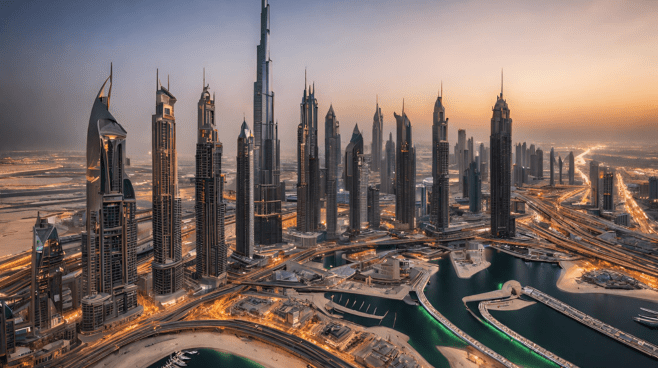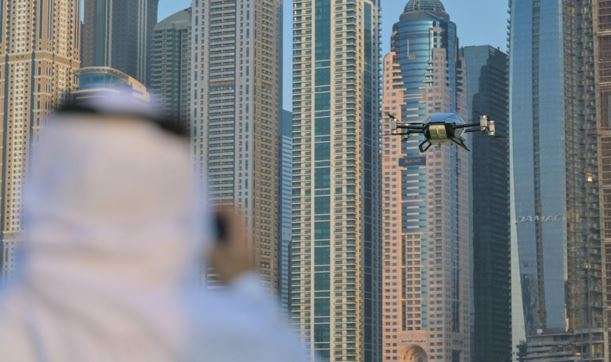Explore Dubai’s legal framework in-depth with our comprehensive guide, Navigating the Legal Landscape: An In-Depth Look at Dubai’s Law and Order System. Gain insights into the intricacies of the city’s legal system, understand key regulations, and stay informed on the latest developments shaping Dubai’s legal landscape. Whether you’re a resident, business professional, or curious observer, this guide offers a thorough examination of Dubai’s law and order, providing valuable knowledge for navigating the legal complexities of this dynamic city.
Introduction
Dubai’s vibrant and cosmopolitan cityscape is not only known for its breathtaking architecture and luxurious lifestyle but also for its robust legal system that ensures order and justice. Navigating the legal landscape in Dubai can be both intriguing and challenging, especially for those unfamiliar with its unique framework. In this article, we will take a comprehensive dive into Dubai’s law and order system, exploring its various facets and shedding light on the importance of understanding the legal framework.
Understanding Dubai’s Law and Order

Dubai’s legal framework draws influence from Islamic law, known as Sharia, as well as civil and criminal law. A thorough understanding of these elements is crucial to comprehend the workings of the legal system in Dubai.
Islamic Law and its Influence
- Role of Sharia in Dubai’s Legal System
Sharia, derived from the teachings of the Quran and the teachings and practices of Prophet Muhammad, serves as the foundation of Dubai’s legal system. It shapes the moral and legal principles that govern various aspects of daily life, including family matters, contracts, and business transactions.
- Principles and Tenets of Islamic Law in Practice
Islamic law emphasizes the principles of justice, equity, and the preservation of public order. It promotes a system where individuals are held accountable for their actions, with strict guidelines on matters such as inheritance, marriage, and financial transactions.
- Impact on Civil and Criminal Cases
In civil cases, Islamic law often plays a significant role in resolving disputes related to personal matters, such as marriage, divorce, and inheritance. In criminal cases, Sharia principles contribute to the determination of punishments and the administration of justice.
Civil Law and Order in Dubai
- Key Elements and Principles of Civil Law
Alongside Sharia, Dubai’s legal system incorporates civil law principles. Civil law focuses on the relationship between individuals and entities, regulating their rights and obligations. Key elements include contract law, property law, and commercial law.
- Rights and Obligations of Individuals and Entities
Under civil law, individuals and entities are entitled to certain rights, such as the right to property, privacy, and freedom of contract. Conversely, they also have corresponding obligations, including honoring contracts, respecting intellectual property rights, and abiding by regulatory standards.
- Jurisdiction and Dispute Resolution Mechanisms
Dubai has established specialized courts to handle civil disputes, such as the Dubai International Financial Centre (DIFC) Courts and the Dubai Courts. These courts provide a comprehensive framework for resolving civil disputes through litigation, arbitration, and mediation, ensuring fair and efficient resolution of conflicts.
Criminal Law and Order in Dubai
- Definition and Types of Criminal Offenses
Dubai’s criminal law covers a wide range of offenses, including theft, fraud, assault, drug-related crimes, and cybercrimes. It is essential to be aware of the different types of offenses and the potential consequences associated with each.
- Investigation, Arrest, and Detention Procedures
Law enforcement agencies in Dubai, such as the Dubai Police Force, are responsible for investigating criminal activities. Upon suspicion of a crime, individuals may be arrested and detained, while investigations take place. Dubai law provides guidelines for the treatment of detainees to safeguard their rights and ensure due process.
- Trial Process and the Principle of Due Process
Dubai’s criminal justice system adheres to the principle of due process, ensuring that individuals accused of crimes are afforded fair trials. Trials are conducted in courts, where evidence is presented, witnesses are examined, and legal representatives advocate for their clients. The process emphasizes ensuring justice while upholding the rights of the accused.
Law and Order Enforcement Agencies and Their Roles

A robust law and order system depend on the collaboration and efficient functioning of various law enforcement agencies in Dubai. Let’s explore the key responsibilities and roles of these agencies.
Dubai Police Force
- Duties, Powers, and Jurisdiction
The Dubai Police Force is entrusted with maintaining public safety, preventing and investigating crimes, and enforcing laws in the city. They have the responsibility of maintaining law and order, managing traffic, and providing emergency services. Additionally, they work in synergy with other agencies to combat illegal activities and ensure the welfare of residents and visitors.
- Crime Prevention and Public Safety Initiatives
The Dubai Police Force places significant emphasis on proactive measures to prevent crime. Through community engagement programs, they raise awareness about safety and security, conduct regular patrols, and employ advanced technologies to enhance surveillance and response capabilities.
- Collaborations with International Law Enforcement Agencies
To combat transnational crime and promote international cooperation, the Dubai Police Force collaborates with law enforcement agencies worldwide. Sharing information and expertise, they ensure effective border control, counter-terrorism efforts, and the extradition of criminals.
Public Prosecution and Judiciary
- Role and Responsibilities of Public Prosecution
The Public Prosecution Office in Dubai is responsible for reviewing evidence presented by law enforcement agencies and deciding whether to proceed with criminal charges. They play a crucial role in initiating the prosecution process and presenting the case before the courts. Their commitment to fairness and justice is vital for upholding the integrity of the legal system.
- Court Structure and Hierarchy in Dubai
Dubai’s court system comprises various levels, including general courts, specialized courts, and appellate courts. These courts handle different types of cases, from civil to criminal, and ensure access to justice for all. The hierarchy facilitates the smooth progression of cases through the legal process, from lower courts to higher courts.
- Fairness, Impartiality, and Transparency in the Judiciary
For the legal system to instill trust and confidence among the public, the judiciary in Dubai is committed to fairness, impartiality, and transparency. Judges uphold these principles while interpreting and applying the law, ensuring a level playing field for all parties involved.
Regulatory Authorities and Their Jurisdiction
- Overview of Regulatory Agencies in Dubai
Dubai’s regulatory authorities oversee various sectors, including finance, trade, real estate, and healthcare. Entities such as the Dubai Financial Services Authority (DFSA), Dubai Economy, and Dubai Health Authority (DHA) have jurisdiction over specific industries and enforce compliance with laws and regulations.
- Roles in Ensuring Compliance with Laws and Regulations
Regulatory authorities play a pivotal role in safeguarding public interest and maintaining regulatory standards. They establish rules and regulations, monitor compliance, investigate potential violations, and impose penalties for non-compliance. Their contribution ensures that businesses and individuals operate within legal boundaries.
- Cooperation and Coordination among Regulatory Bodies
To ensure the effectiveness of regulatory efforts, Dubai’s regulatory bodies collaborate and coordinate their initiatives. Sharing information, expertise, and best practices, they foster alignment between sectors, enabling comprehensive oversight and promoting a harmonious regulatory environment.
Safeguarding Individual Rights in Dubai

Dubai values the protection of individual rights and has implemented various measures to ensure their preservation within its legal system.
Human Rights and their Protection
- International Human Rights Standards in Dubai
Dubai is committed to upholding international human rights standards and has adopted relevant conventions and treaties. The protection of fundamental rights, such as the right to life, liberty, and fair trial, is of paramount importance within the legal framework.
- Measures to Uphold Human Rights in Legal Proceedings
Dubai’s legal system incorporates safeguards to protect human rights during legal proceedings. These measures include the presumption of innocence, the right to legal representation, and the prohibition of torture or cruel treatment. Ensuring fair trials and upholding human rights principles is a cornerstone of the legal landscape in Dubai.
- Initiatives for Promoting Equal Access to Justice
Dubai recognizes the importance of equal access to justice for all individuals, regardless of economic or social background. Initiatives such as legal aid services, pro bono support from legal professionals, and awareness programs about legal rights and responsibilities contribute to promoting equal access to justice.
Aid and Support Services
- Availability of Legal Aid for Citizens and Residents
Dubai ensures access to legal aid for its citizens and residents who may require assistance in legal matters. Legal aid services offer guidance, representation, and support to individuals who cannot afford legal representation, promoting equitable access to justice.
- Role of Pro Bono Services and Non-Profit Organizations
Non-profit organizations and pro bono services play a significant role in complementing legal aid efforts in Dubai. These initiatives provide free legal advice and representation to those in need, fostering a sense of social responsibility within the legal community.
- Awareness Programs for Legal Rights and Responsibilities
Dubai hosts awareness programs, workshops, and educational campaigns to educate individuals about their legal rights and responsibilities. These initiatives empower individuals to make informed decisions, understand the legal framework, and navigate the legal landscape effectively.
Rights and Obligations of Expatriates
- Legal Rights and Protections for Expatriates
Dubai recognizes the rights of expatriates and ensures their legal protections within its legal system. Expatriates enjoy fundamental rights such as the right to own property, seek employment, and access essential services.
- Obligations Towards the Host Country’s Laws
While enjoying legal protections, expatriates also have the responsibility to abide by the laws and regulations of the host country. Compliance with Dubai’s legal framework is essential to maintain social harmony, mutual respect, and contribute to the city’s cohesive multicultural fabric.
- Concept of “Dubai as a Tolerant City”
Dubai prides itself on being a tolerant city, embracing individuals from diverse backgrounds. It reflects a progressive mindset by fostering an inclusive environment where individuals can practice their cultural, religious, and legal customs while respecting the boundaries set by the legal system.
Summary and Frequently Asked Questions (FAQs)
Summary of Dubai’s Law and Order System
- Key Takeaways and Understanding the Legal Landscape
In summary, Dubai’s law and order system comprise a comprehensive framework that draws influence from Islamic law, civil law principles, and criminal law. It encompasses various law enforcement agencies, regulatory authorities, and safeguards individual rights while promoting equal access to justice.
- Importance of Compliance and Awareness
Compliance with Dubai’s legal framework is vital for individuals and entities to operate within the boundaries of the law. Awareness of legal rights and responsibilities enables individuals to navigate the legal landscape effectively and contribute to a just society.
Frequently Asked Questions (FAQs)
How does Dubai’s legal system reflect its cultural values?
Dubai’s legal system reflects the cultural values of the region by incorporating Islamic law principles, emphasizing justice, fairness, and the preservation of public order. It places importance on family values, honor, and accountability, aligning with the cultural norms upheld by the city.
Can expatriates access legal aid services in Dubai?
Yes, expatriates in Dubai can access legal aid services, ensuring that they have equitable access to justice. These services provide guidance and support in legal matters, contributing to a fair and inclusive legal landscape.
What are the measures taken to ensure fair trials in Dubai?
Dubai prioritizes fair trials, and measures are in place to uphold this principle. The legal system ensures the presumption of innocence, the right to legal representation, and the prohibition of torture or cruel treatment. These safeguards ensure that individuals receive a fair and impartial trial.
How do the law enforcement agencies collaborate internationally?
Dubai’s law enforcement agencies collaborate with international counterparts through information sharing, joint operations, and legal agreements. These collaborations enable effective border control, counter-terrorism efforts, and the extradition of criminals, ensuring global security and cooperation.
What resources are available for individuals to educate themselves about the law in Dubai?
Dubai offers a range of resources for individuals to educate themselves about the law. Awareness programs, workshops, and educational campaigns provide information about legal rights and responsibilities. Additionally, legal aid services and non-profit organizations offer guidance and support for those seeking legal assistance.



